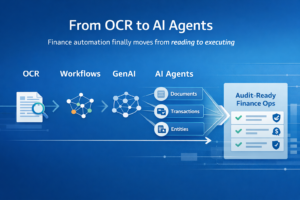Artificial Intelligence (AI) is no longer a distant concept for finance teams. It’s powering everything from Accounts Payable automation to cash flow forecasting. Yet adoption remains cautious. Surveys show that 67% of finance leaders cite data privacy as their top concern, followed by bias (47%) and loss of oversight (40%).
For CFOs, Controllers, and Treasury executives, these challenges directly impact whether AI becomes a trusted partner or a new source of risk. Addressing them is essential to realizing the full promise of AI in finance.
Data Privacy: Protecting the Crown Jewels
Financial data is among the most sensitive assets an organization holds. Transaction histories, supplier details, and account records carry both opportunity and liability.
Challenges
- How AI models store, process, and transmit sensitive information
- Exposure to unauthorized access through third parties or cloud environments
- Complex compliance requirements across geographies (GDPR, CCPA, PCI DSS)
Path Forward
- Limit access: Ensure AI systems only use the data necessary for a given task
- Encrypt everywhere: In transit, at rest, and ideally during processing
- Demand transparency: Require vendors to document how they handle and safeguard data
Proactive protection transforms compliance from a checklist into a competitive advantage.
Bias: The Hidden Risk in Financial Decisions
AI learns from historical data, and historical data often carries systemic bias. Left unchecked, this can distort outcomes in areas such as lending, credit scoring, or supplier evaluation.
Challenges
- Risk of unfair or skewed outcomes
- Dependence on outdated anomalies that no longer reflect reality
- Regulatory exposure under fair lending and anti-discrimination laws
Path Forward
- Audit models: Test regularly for skewed results across demographics or transaction types
- Diversify training data: Use representative datasets to minimize systemic bias
- Keep experts in the loop: Combine AI outputs with human oversight
Reducing bias improves both compliance and the credibility of AI-driven insights.
Trust: Building Confidence in AI Outcomes
Even when data is secure and bias is addressed, the “black box” nature of AI can create unease. Finance leaders are accountable for decisions but often cannot explain how a model reached its recommendation.
Challenges
- Limited visibility into model logic
- Perception that AI reduces executive control
- Reputational risk if errors or anomalies go undetected
Path Forward
- Invest in explainable AI: Systems should show why invoices are flagged, transactions held, or payments delayed
- Create governance frameworks: Establish clear rules for training, validation, and monitoring
- Adopt progressively: Start with AI-assisted workflows before moving to fully autonomous agents
Transparency, accuracy, and strong guardrails are the foundation of trust.
The Road Ahead
Adopting AI in finance is not about replacing people – it’s about equipping them to work smarter. By prioritizing privacy, addressing bias, and building trust, finance leaders can move beyond hesitation and harness AI as a driver of resilience and growth.
Organizations that tackle these challenges directly will not only keep pace with innovation but also set the standard for responsible, secure, and trusted automation.
Learn how Itemize AI Agents deliver compliance, transparency, and control in financial automation – helping finance teams adopt AI with confidence.
Request a Demo




